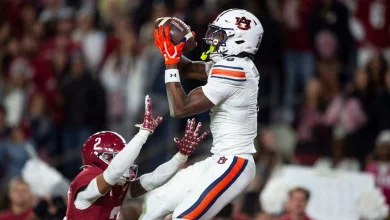USC joins Nebraska and Ohio State calling off its annual spring football game

In an unexpected move, the University of Southern California (USC) announced that it would be joining Nebraska and Ohio State in canceling its annual spring football game for the 2025 season. The decision to forgo the traditional scrimmage game, which has long been a highlight of the college football offseason, has raised questions across the college football world. As programs across the nation adjust to the changing landscape of college athletics, including NIL (Name, Image, and Likeness) deals, expanded transfer portals, and increasingly competitive recruiting cycles, the cancellation of these spring games signals a shift in how programs are choosing to approach their spring preparations.
The spring football game, typically an opportunity for fans to get a first look at new recruits, returning players, and an early preview of the team’s upcoming season, has long been a cornerstone of college football culture. However, USC’s decision, alongside Nebraska and Ohio State, marks a significant break from tradition, with major implications for the way programs approach spring training and fan engagement. In this article, we’ll take a closer look at why these teams, particularly USC, are making this decision, the impact on their programs, and what it could mean for the future of the college football offseason.
Why Are Schools Like USC, Nebraska, and Ohio State Cancelling Their Spring Games?
To understand the broader implications of USC’s decision, it’s important to first explore the reasons behind the growing trend of canceling spring games. While each school may have its specific motivations, the overarching factors include concerns about player safety, the changing dynamics of the offseason, and the increasing complexity of roster management.
1. Player Safety Concerns and Injuries
The most immediate and obvious reason for canceling a spring game revolves around player safety. College football programs are increasingly aware of the risks posed by spring scrimmages, where key players could suffer injuries in a setting that holds little competitive value. While the spring game provides an opportunity for fans to see the team in action, it is often little more than a controlled scrimmage designed to showcase the team rather than test it against live competition.
In recent years, there has been a growing concern about players sustaining injuries in these non-essential games, especially given the high toll that football takes on athletes. Programs like USC, Nebraska, and Ohio State recognize that losing a key player—particularly during a time of year when the season is still months away—can be detrimental to a team’s overall goals. For programs with national championship aspirations, the risk of a season-altering injury in a spring game simply outweighs the reward of fan engagement. This is particularly relevant for high-profile programs that can ill afford to lose their star players in meaningless scrimmages.
At USC, which has been striving to build its program back into a national contender under head coach Lincoln Riley, player health is a paramount concern. USC’s spring game typically involves many of its key players, including those who are returning after significant seasons. Protecting the health of these athletes—especially as the Trojans prepare for what could be another playoff run—takes precedence over fan-driven events like spring games.
2. The Evolving Nature of Spring Training and Roster Management
The demands of the modern college football landscape are forcing teams to rethink how they approach the offseason. Gone are the days when spring football camps were the sole opportunity to gauge a team’s progress, evaluate new players, and test new schemes. In the age of the transfer portal and NIL, offseason recruitment, roster turnover, and developing depth have become increasingly complex tasks.
Coaches now have far less time to evaluate players in traditional spring camps, as recruiting and roster building extend beyond high school and into the transfer portal. This shifting dynamic has changed the importance of spring games. With roster turnover so high, coaches are far more focused on evaluating their current players during spring practice sessions, rather than in a game-like environment. For schools like USC, Nebraska, and Ohio State, the emphasis is now on having their players develop in more controlled settings rather than in public-facing exhibitions.
In particular, USC’s roster has seen notable changes as it continues to integrate new transfer players and continue to recruit top high school prospects. Lincoln Riley and his coaching staff will likely prioritize development and integration over putting their team in a potentially vulnerable situation for public viewing. In the modern age of recruiting, showcasing spring games for fans is no longer the sole priority—ensuring that all players, especially transfers, are well-integrated into the system and ready for the upcoming season is the focus.
3. Financial and Logistical Concerns
Another less discussed but increasingly important reason for canceling spring football games is the logistical and financial burden that these events place on programs. While spring games have traditionally been seen as a way for schools to engage their fan base, raise money for the program, and get players accustomed to game-day environments, there are growing concerns about the financial returns from these events.
With college football programs facing financial challenges related to COVID-19 and fluctuating revenue streams, some athletic departments are opting to scale back on events that don’t offer substantial returns. The costs of organizing and hosting a spring game, including security, staffing, stadium expenses, and broadcasting, can add up quickly. In some cases, schools may determine that these costs do not justify the relatively small returns from ticket sales or media coverage.
Additionally, logistical challenges can arise from putting together a spring game that satisfies fans, media, and program goals. Scheduling conflicts, limited available practice time, and the desire to manage fatigue for players all contribute to why some programs are opting to forgo the traditional spring game in favor of more focused and private scrimmages that allow them to control the environment more tightly.
Impact on USC Football’s Brand and Recruiting
One of the immediate concerns for fans and analysts following USC’s decision is how the cancellation of the spring game will impact the program’s brand and recruiting efforts. Spring games are often an opportunity for recruits, fans, and alumni to connect with the program, and some worry that losing this public-facing event will make it more difficult to build excitement and showcase the program’s growth.
Recruiting and Fan Engagement
While it’s true that spring games serve as a great recruiting tool—showcasing new talent, giving recruits a taste of the atmosphere, and connecting prospects with the coaching staff—it’s also important to recognize that recruiting has evolved. In the NIL era, recruits are making their decisions based on a variety of factors, including potential financial opportunities, a program’s track record of developing talent, and the team’s ability to win championships. The actual spring game itself is not as significant a selling point as it once was.
For USC, which has made great strides in recent years under Riley’s leadership, the emphasis on developing relationships with recruits through official visits, private workouts, and other more personal recruiting strategies may outweigh the benefits of a public spring game. Riley’s track record of success, particularly at Oklahoma, speaks volumes to recruits, and USC’s ability to showcase its facilities, coaching, and talent development will continue to be powerful tools, whether or not a spring game is played.
Fan Engagement
On the other hand, USC’s decision to cancel its spring game might impact fan engagement, especially among alumni and long-time supporters. The spring game has been a tradition at many schools, offering fans the chance to come together, watch their team in action, and get a sneak peek at the upcoming season. For fans who live in Southern California, the spring game serves as a symbol of the renewal of the football season—a chance to reconnect with the program in a meaningful way.
While USC’s decision to forgo the spring game may disappoint some fans, the Trojans have done a good job of engaging with their fan base through social media, live broadcasts of practices, and recruiting updates. As USC continues to make waves on the recruiting trail and gain attention with high-profile commitments, the excitement around the program may ultimately be sustained by the team’s on-field performance rather than a spring game.
What’s Next for College Football and the Spring Game Tradition?
The cancelation of the spring football game by programs like USC, Nebraska, and Ohio State is indicative of a larger trend in college football, where the tradition of spring games is being re-evaluated in light of modern challenges. With the advent of the transfer portal, NIL, and the increasing emphasis on player safety, it’s clear that spring football is evolving. College football programs now must balance fan engagement with the practical realities of player development, injury prevention, and the increasing financial burdens of running major athletic programs.
While USC’s decision is likely not the last of its kind, it’s important to remember that these changes do not signal the end of college football as we know it. Instead, they reflect a shift in priorities—one that places player health, long-term success, and effective program management at the forefront. While fans may miss the spectacle of the spring game, the future of college football remains strong, with teams continuing to innovate and adapt to new realities.
As USC, Nebraska, Ohio State, and other programs adapt to these changes, the key question will be how they continue to foster strong relationships with their fan base, develop talent, and position themselves for success on the national stage. The cancellation of the spring football game is just one chapter in a larger narrative of college football’s evolution—one that will continue to shape the sport in exciting new ways in the years to come.









